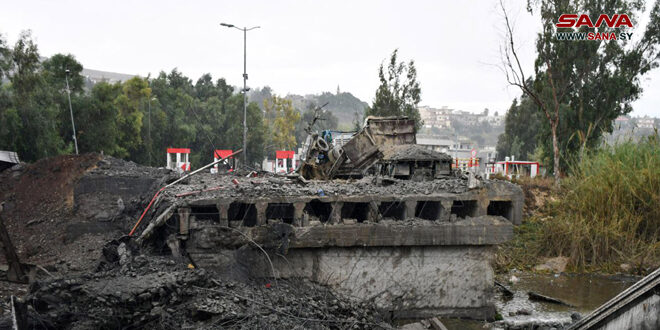On Sunday, Israeli planes resumed their bombardment of targets in Damascus, Syria’s capital. Airstrikes hit the Mezzeh airport and the Kafarsouseh area. Sources in Damascus told Al-Araby Al-Jadeed that explosions were reported near the Security Square, which houses the General Intelligence and customs buildings, with large fires visible in the area. The Israel Broadcasting Corporation also reported that one of the targets was the Scientific Research Center in Damascus, which is suspected to be involved in chemical weapons and ballistic missile programs.
A Lebanese security source and a Syrian source confirmed to Reuters that Israeli airstrikes targeted the Mezzeh neighborhood of Damascus. Additionally, two regional security sources indicated that Israeli planes bombed the Khalkhala air base in southern Syria, which had been evacuated by Syrian forces overnight.
The two security sources reported at least six strikes on the Khalkhala air base, located north of Suweida. The base is believed to house a significant stockpile of rockets and missiles left by Syrian forces. One source suggested that the attack was intended to prevent these weapons from falling into the hands of armed groups.
Israeli media reports, including The Jerusalem Post, confirmed that the Israeli Air Force struck a chemical weapons facility in Syria. The attack was reportedly carried out due to concerns that weapons developed during the regime of ousted President Bashar al-Assad could fall into the hands of opposition forces. Israeli television channel N12 also reported on the strike.
Meanwhile, Israeli warplanes targeted military sites in Syria’s Daraa and Suweida governorates. This coincided with an incursion by Israeli special forces into the Quneitra governorate, near the occupied Golan Heights, where they took control of a buffer zone. Reuters also reported that Israeli airstrikes targeted the Mezzeh neighborhood and the Khalkhala air base.
According to Ahrar Horan, Israeli warplanes bombed sites near the town of Inkhil and the village of Qaita in northern Daraa, likely targeting weapons depots. Further airstrikes targeted former regime military depots in Tal Hamad near Nawa in western Daraa. Israeli artillery also hit areas around the village of Ma’rayya in Quneitra.
Daraa 24, a local network, confirmed that these raids were aimed at preventing weapons from falling into the hands of groups that could pose a threat to Israel or the region. Sawt al-Asima, another local site, reported that the Israeli strikes completely destroyed the Mezzeh military airport and all air defenses around Damascus.
According to Al-Araby Al-Jadeed Israeli warplanes also flew over Homs governorate in the afternoon, in conjunction with ongoing strikes in southern Syria.
Israeli Incursion into Quneitra
In a parallel development, Israeli forces conducted a limited incursion into Quneitra governorate, Syria, following the fall of Damascus to opposition factions. A local source told Al-Araby Al-Jadeed that an Israeli force entered Khan Arnaba and al-Baath City, conducting combing operations and firing shells while Israeli warplanes were in the area. The source reported that the Israeli forces withdrew without causing casualties.
CNN noted that Israeli Prime Minister Benjamin Netanyahu said that the collapse of Bashar al-Assad’s regime in Syria was a “direct result” of Israel’s military campaign against Iran and its proxy in Lebanon, Hezbollah. “This is a historic day in the history of the Middle East,” he said. “Together with the Defense Minister, and with full backing from the Cabinet, I directed the IDF yesterday to take control of the buffer zone and the dominant positions near it,” he said while visiting the Golan Heights. “We will not allow any hostile force to establish itself on our border.”
A source from DPA (German news agency) confirmed the limited incursion and the firing of four shells. Sawt al-Asima added that Israeli forces advanced again, reaching Jisr al-Raqqad in the countryside of Quneitra, and reports emerged of an entire family being arrested in the area.
The Israeli military announced it had deployed reinforcements to the Golan Heights after an attack by militants on a United Nations site in the Hadar area near Khan Arnaba. An Israeli statement claimed that its forces assisted UN personnel in repelling the attack.
The Israeli army also confirmed it had stationed troops in the Golan Heights buffer zone, citing the possibility of armed groups entering the area. The army stated it would continue to deploy forces as necessary to ensure the security of both the Golan Heights and Israel’s citizens.
Israeli Channel 12 reported that the incursion was a security measure after Syrian rebels took control of Quneitra, a region that lies near Israel’s border. Israeli sources emphasized that they would not allow Syrian opposition forces to seize strategic weapons from the Assad regime. Israeli officials also warned Syrian rebels not to approach the border, threatening forceful retaliation in the event of any violations of the separation of forces agreement.
On Saturday, Syrian armed opposition groups announced their control of Quneitra in the Golan following the Syrian army’s withdrawal. U.N. peacekeepers have been deployed in a 235-square-kilometer buffer zone between Israel and Syria. Israel has occupied the Golan Heights since 1967 and annexed it in 1981, although the area is still considered occupied under international law.
This article was translated and edited by The Syrian Observer. The Syrian Observer has not verified the content of this story. Responsibility for the information and views set out in this article lies entirely with the author.


